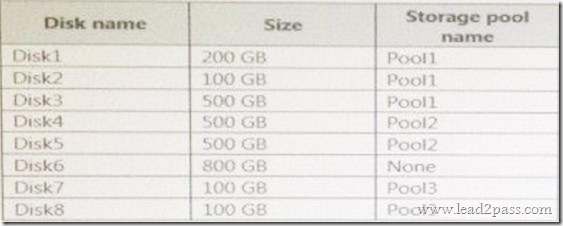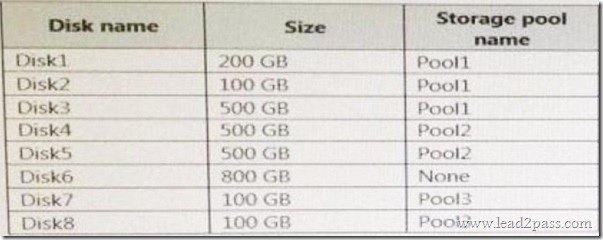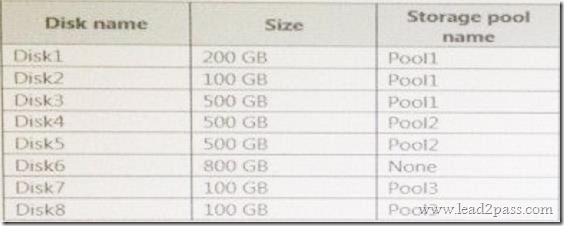New Lead2pass 70-698 Dumps PDF Version Released For Free Downloading:
https://www.lead2pass.com/70-698.html
QUESTION 31
Note: This question is part of a series of questions that use the same set of answer choices. Each answer choice may be used once, more than once, or not at all.
You have a computer named Computer1 that has storage configured as shown in the following table.
Pool1 contains a storage space named Space1 that is 300 GB. Pool3 contains a storage space named Space2 that is 100 GB.
Pool2 is empty.
You need to add Disk6 to Poo1. What should you use?
A. Add-PhysicalDisk
B. Diskpart
C. New-VirtualDisk
D. Remove-PhysicalDisk
E. Resize-VirtualDisk
F. Set-StoragePool
G. Subst
H. Update-Disk
Answer: A
Explanation:
https://technet.microsoft.com/en-us/library/hh848702(v=wps.630).aspx
QUESTION 32
Note: This question is part of a series of a questions that use the same set of answer choices. Each answer choice may be used once, more than once, or not at all.
You have a computer named Computer1 that has storage configured as shown in the following table.
Pool1 contains a storage space named Space1 that is 300 GB. Pool3 contains a storage space named Space2 that is 100 GB.
Pool2 is empty.
You need to add a storage space to Pool2. What should you use?
A. Add-PhysicalDisk
B. Diskpart
C. New-VirtualDisk
D. Remove-PhysicalDisk
E. Resize-VirtualDisk
F. Set-StoragePool
G. Subst
H. Update-Disk
Answer: A
Explanation:
https://technet.microsoft.com/en-us/library/hh848702(v=wps.630).aspx
QUESTION 33
Note: This question is part of a series of questions that use the same set of answer choices. Each answer choice may be used once, more than once, or not at all.
You have a computer named Computer1 that has storage configured as shown in the following table.
Pool1 contains a storage space named Space1 that is 300 GB. Pool3 contains a storage space named Space2 that is 100 GB.
Pool2 is empty.
You need to add Disk7 to Pool1. What should you use first?
A. Add-PhysicalDisk
B. Diskpart
C. New-VirtualDisk
D. Remove-PhysicalDisk
E. Resize-VirtualDisk
F. Set-StoragePool
G. Subst
H. Update-Disk
Answer: D
Explanation:
https://technet.microsoft.com/en-us/library/hh848697(v=wps.630).aspx
QUESTION 34
Note: This question is part of a series of questions that use the same set of answer choices. Each answer choice may be used once, more than once, or not at all.
You have a computer named Computer1.
Computer1 has a virtual hard disk (VHD) named Disk1 .vhdx.
Disk1 vhdx has an NTFS partition, which is visible in File Explorer as drive E.
You need to provision Windows 10 on Disk1.vhdx.
What should you run?
A. Add-Windows Image
B. bcdboot.exe
C. bcdedit.exe
D. bootcfg.exe
E. bootim.exe
F. bootsect.exe
G. diskpart.exe
H. Expand-Windows Image
Answer: G
Explanation:
https://docs.microsoft.com/en-us/windows-hardware/manufacture/desktop/boot-to-vhd–native-boot–add-a-virtual-hard-disk-to-the-boot-menu
QUESTION 35
Note: This question is part of a series of questions that use the same set of answer choices. Each answer choice may be used once, more than once, or not at all.
You have a computer that has a dual-boot configuration. Windows 10 Pro is installed on the local disk. Windows 10 Enterprise is installed in a VHDX file named Disk1vhdx.
You start the computer to Windows 10 Pro, and then you download a driver package.
You need to ensure that the next time the Windows 10 Enterprise installation starts, the driver is installed already.
What should you run first?
A. Add-Windows Image
B. bcdboot.exe
C. bcdedit.exe
D. bootcfg.exe
E. bootim.exe
F. bootsect.exe
G. diskpart.exe
H. Expand-Windows Image
Answer: G
Explanation:
https://technet.microsoft.com/en-us/library/dd799267(v=ws.10).aspx#BKMK_addDrivers
QUESTION 36
Note: This question is part of a series of questions that use the same set of answer choices. Each answer choice may be used once, more than once, or not at all.
You have a computer named Computer1 that has a dual-boot configuration. Computer1 has Windows 8.1 and Windows 10 installed.
You need to configure Computer1 to use only 4 GB of RAM when the computer starts in Windows 10.
What should you run?
A. Add-Windows Image
B. bcdboot.exe
C. bcdedit.exe
D. bootcfg.exe
E. bootim.exe
F. bootsect.exe
G. diskpart.exe
H. Expand-Windows Image
Answer: C
Explanation:
https://technet.microsoft.com/en-us/library/cc709667(v=ws.10).aspx
QUESTION 37
Note: This question is part of a series of questions that use the same scenario. For your convenience, the scenario is repeated in each question. Each question presents a different goal and answer choices, but the text of the scenario exactly the same in each question in this series.
Start of repeated scenario
Your network contains a single Active Directory domain named contoso.com. All computers are members of the domain and run the 64-bit version of Windows 10 Enterprise. On a test computer named Computer_Test1, you pin several company-specific applications in a group named Contoso Apps, and then you export the start menu layout to a file named contoso.xml.
You install Client Hyper-V on a computer named Computer6.
You identity the following requirements.
– Install the Hyper V feature on a computer named Computer1.
– Use virtual smart card authentication on a computer named Computer2.
– Enable Secure Boot on a computer named Computer3.
– Connect a computer named Computer4 to a projector by using Miracast.
– Ensure that a user named User 1 can use keyboard shortcuts by pressing one key at a time.
– Ensure that you can share the clipboard between Computer6 and the virtual machines running on Computer6.
– Add the Contoso Apps group to the Start menu of a computer named Computer7.
End of repeated scenario.
You install all of the Contoso apps on Computer7.
You need to meet the requirements of Computer7.
What should you do?
A. Run the Import-StartLayout cmdlet.
B. Copy Contoso.xml to the C:\Users\Default\Start menu folder
C. Configure the Start Menu and Taskbar settings in a Group Policy.
D. Copy Contoso.xml to the C:\ProgramData\Microsoft\Windows\Start Menu folder.
Answer: A
Explanation:
https://blogs.technet.microsoft.com/deploymentguys/2016/03/07/windows-10-start-layout-customization/#Exporting
QUESTION 38
Note: This question is part of a series of questions that use the same scenario. For your convenience, the scenario is repeated in each question. Each question presents a different goal and answer choices, but the text of the scenario exactly the same in each question in this series.
Start of repeated scenario
Your network contains a single Active Directory domain named contoso.com. All computers are members of the domain and run the 64-bit version of Windows 10 Enterprise. On a test computer named Computer_Test1, you pin several company-specific applications in a group named Contoso Apps, and then you export the start menu layout to a file named contoso.xml. You install Client Hyper-V on a computer named Computer6.
You identity the following requirements.
– Install the Hyper V feature on a computer named Computer1.
– Use virtual smart card authentication on a computer named Computer2.
– Enable Secure Boot on a computer named Computer3.
– Connect a computer named Computer4 to a projector by using Miracast.
– Ensure that a user named User 1 can use keyboard shortcuts by pressing one key at a time.
– Ensure that you can share the clipboard between Computer6 and the virtual machines running on Computer6.
– Add the Contoso Apps group to the Start menu of a computer named Computer7.
End of repeated scenario.
You need to meet the requirement of Computer6. What should you configure?
A. NUMA spanning
B. enhanced session mode
C. Hyper-V Guest Service Interface
D. RemoteFX
Answer: B
Explanation:
https://technet.microsoft.com/en-us/windows-server-docs/compute/hyper-v/learn-more/use-local-resources-on-hyper-v-virtual-machine-with-vmconnect
70-698 dumps full version (PDF&VCE): https://www.lead2pass.com/70-698.html
Large amount of free 70-698 exam questions on Google Drive: https://drive.google.com/open?id=0B3Syig5i8gpDa2cwaDdKY1dLdHM
You may also need:
70-697 exam dumps: https://drive.google.com/open?id=0B3Syig5i8gpDX3RYMG04cEg5aEE


